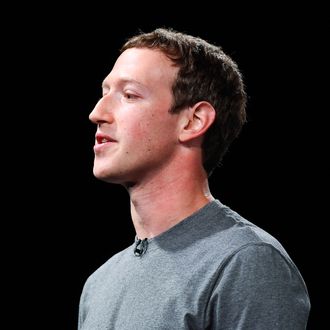
The American people have lost faith in their government. Decades of wage stagnation and political dysfunction have driven millions of voters into the anti-Establishment campaigns of Bernie Sanders and Donald Trump. But countless others survey the 2016 landscape and despair at all of their options: Must they choose between a Washington insider, a potty-mouthed reality star, or some half-dead Bolshevik? This silent majority puts down the newspaper each morning and sighs, “Who will speak out for the normal, salt-of-the-earth, blue-collar folks who want to see their political system disrupted by socially liberal, fiscally moderate innovators from Silicon Valley?”
In Tuesday’s Wall Street Journal, former Politico CEO Jim VandeHei heeds their call. VandeHei brings a unique perspective to the 2016 race, as he explains in his op-ed’s opening paragraph. While he’s spent most of his adult life ensconced in “the Washington, D.C. bubble,” he also owns property in Lincoln, Maine, a “blue collar town” in the “heart of Normal America.” Drawing on his insights from decades of political reporting and occasional grocery-store conversations with unexceptional white people, VandeHei lays out his vision for how to unite America and reinvigorate its Establishment at the same time. In short, he calls on Facebook CEO Mark Zuckerberg to mount a third-party challenge, running as the nominee of the Innovation Party, on a platform of Social Security cuts, killer apps, and military rule.
The appeal of such a campaign is so intuitive, it seems hardly necessary to sweat the details of VandeHei’s pitch. But those details are well worth examining, as they overflow with the reporter’s uncanny insights into the national psyche.
“Normal America is right that Establishment America has grown fat, lazy, conventional and deserving of radical disruption,” VandeHei begins. “And the best, perhaps only way to disrupt the establishment is by stealing a lot of Donald Trump’s and Bernie Sanders’s tricks and electing a third-party candidate.”
Specifically, VandeHei suggests that in order to win over America’s heartland, this candidate will need to “engage voters daily on social media, with fun and flare. (Think Trump with impulse control and better spelling.).” The candidate should also draw on Sanders’s populist shtick, by forcing “the wealthy to forfeit their entitlement benefits.” Medicare cuts for some, miniature American-flag emoji for others!
Next, VandeHei observes that there has been far too much nuance — and far too little fearmongering — in America’s debate about terrorism.
“Exploit the fear factor. The candidate should be from the military or immediately announce someone with modern-warfare expertise or experience as running mate,” he writes. “A third-party candidate could build on death-by-drones by outlining the type of modern weapons, troops and war powers needed to keep America safe. And make plain when he or she will use said power. Do it with very muscular language—there is no market for nuance in the terror debate.”
Normal America wants a candidate who is less impulsive than Trump when using Twitter, but more impulsive when using military force. Also, they’d like to see the U.S. president introduce an app that makes it easier for children to meet strangers online.
“We have breathtaking technology to find a ride or a date with the swipe of a screen. Those same innovators could help create a ‘National App’ to match every kid who needs a mentor with a mentor,” he writes.
Any candidate who followed VandeHei’s advice to the letter would be extremely competitive in November. But the right standard-bearer could ensure a landslide for “the Innovation Party.” In one of the most well-reasoned paragraphs you’ll read this year, VandeHei lays out a dream team:
Right now, millions of young people are turned on by a 74-old-year socialist scolding Wall Street; millions of others by a reality-TV star with a 1950s view of women. Why not recruit Facebook’s Mark Zuckerberg or Sheryl Sandberg to head a third-party movement? Maybe we can convince Michael Bloomberg to help fund the movement with the billions he planned to spend on his own campaign—and then recruit him to run Treasury and advise the president.
A lot of Americans hate plutocracy and enjoy misogyny. Therefore, they would love to vote for Facebook’s top executives, in a campaign bankrolled by a Wall Street titan. This argument is so brilliant, you can’t stare directly into it without frying your retinas.
After all, Zuckerberg, Sandberg, and Bloomberg all support free trade and open immigration — and if there’s anything that unites Sanders and Trump supporters, it’s their enthusiasm for globalization. Furthermore, Zuckerberg is uniquely positioned to fulfill these voters’ desire for an outsider candidate — who is more of an outsider than a billionaire who isn’t even old enough to constitutionally serve as president?
Upon finishing VandeHei’s column, the reader can’t help but be awed by its profundity. Still, after some hours of reflection, a single flaw in his argument becomes apparent: Why outsource this perfect platform to some big-name entrepreneur or army general? Wouldn’t it be more authentic, disruptive, and innovative for the visionary himself to throw his hat in the ring? VandeHei is planning to leave Politico by year’s end, so he’s clearly available.
Please, Jim VandeHei, do not hoard your brilliance in the private sector. Now more than ever, our fragile republic needs a practitioner of D.C. access journalism, with a fetish for preemptive wars, Silicon Valley CEOs, and grand bargains, to tell it what to do.






























